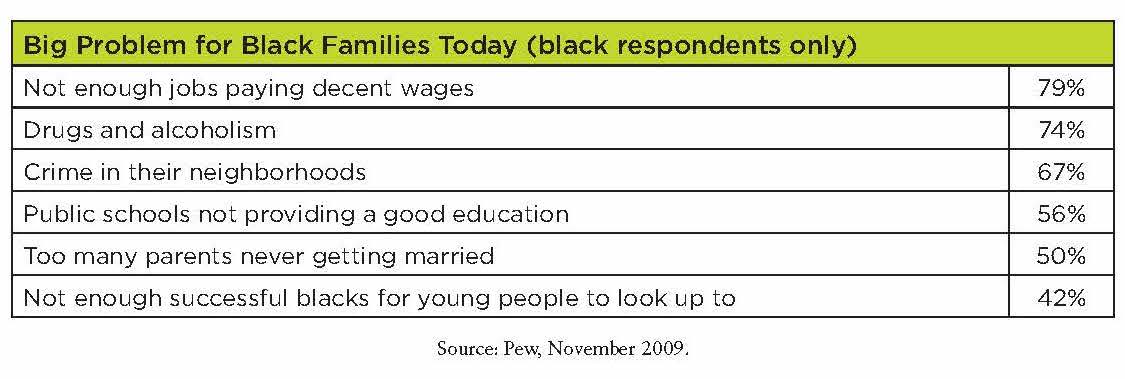Issue Focus
Policy perceptions and relationship to race
Economic concerns dominate the nation’s priorities (87 percent say strengthening the economy is a top priority, 84 percent say improving the job situation is a top priority). While economic concerns are often near the top of the nation’s agenda, the dramatic economic downturn pushed national security concerns even lower on the agenda: dealing with terrorism (73 percent), followed by improving education (66 percent) and stabilizing Social Security (66 percent). Notably, crime (44 percent) is far lower on the national priority agenda. (Pew, 2011; see Figure 12)
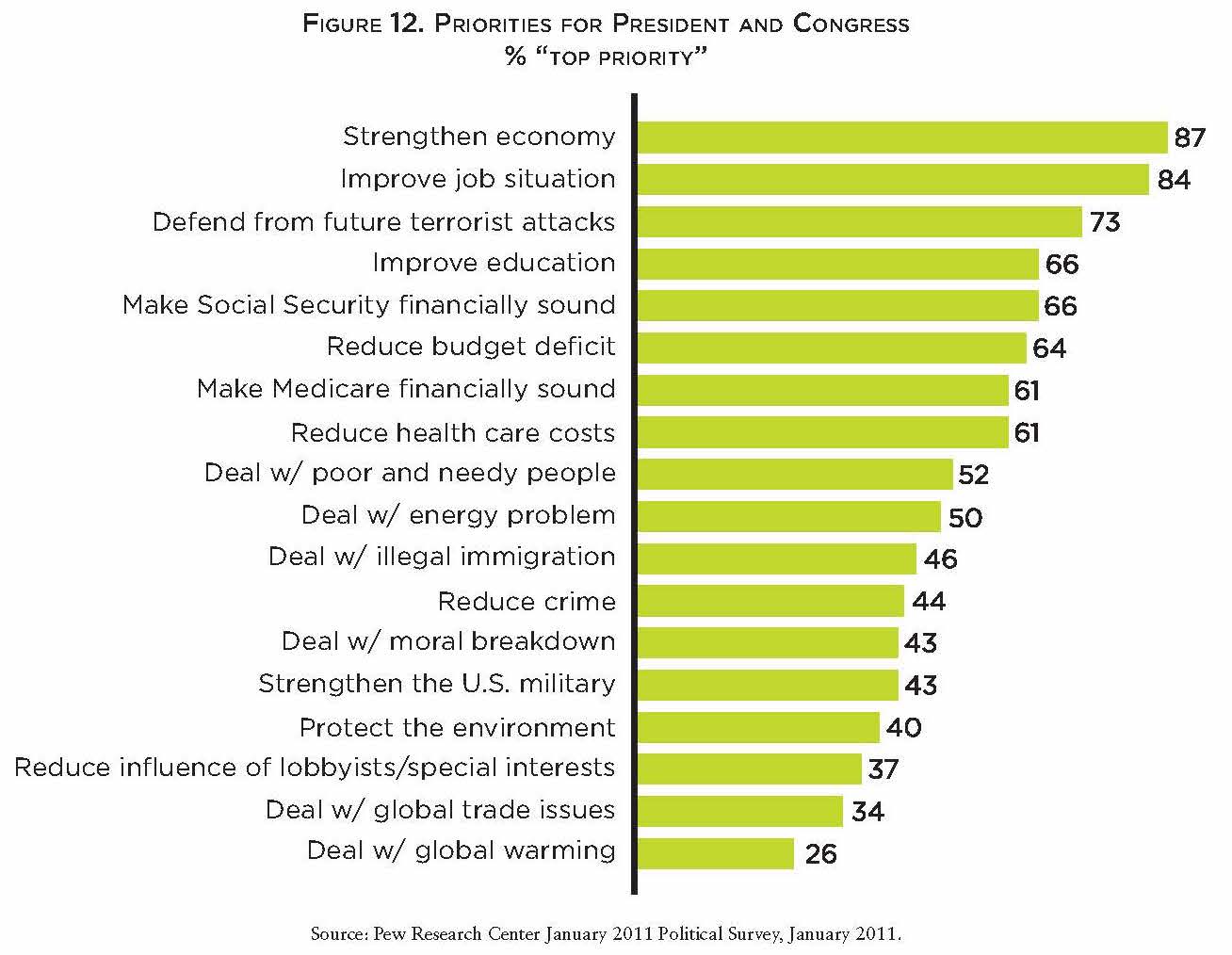
As they consider the problems facing black families, black respondents point to some of the same priorities as the national priorities listed above. Jobs are the top priority (79 percent) and education is rated highly by a majority (56 percent). Interestingly, very high percentages of black respondents rate drugs (74 percent) and crime (67 percent) as top priorities for black families, even though crime does not rank as one of the higher national priorities in general. (Pew, 2009; see Figure 13)
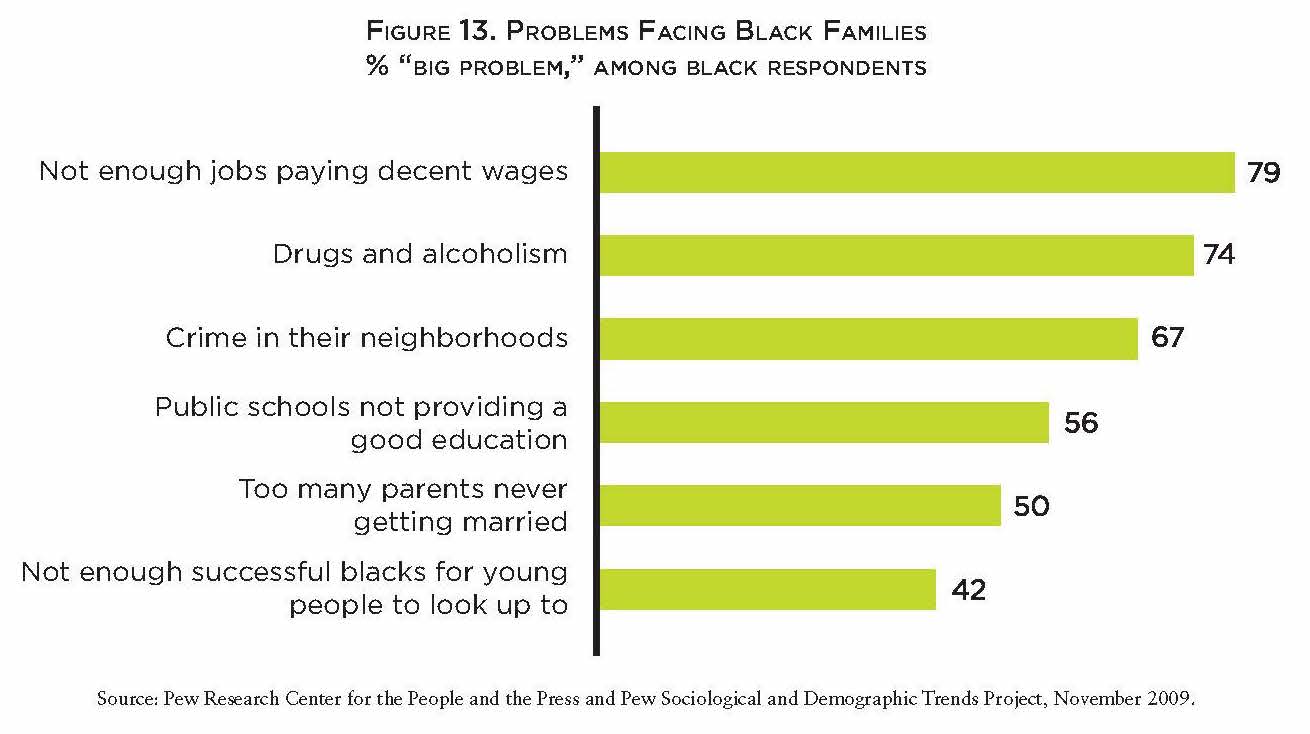
When it comes to addressing racial disparities, do some issue areas offer more opportunity for gains than others? Research designed to develop messages to address disparities offers guidance in answering this question, but existing public opinion data also provide some clues.
Jobs, education, and crime, among the top three priorities for black families, should be central to any strategy designed to advance policy on their behalf. Fortunately, there are reasons to believe that each of these areas offers promising opportunities. In addition, this section includes a brief review of the limited research related to fatherhood.
Education
Education shows enormous potential as an issue that can cross race, engage white respondents in coalition with black communities, and energize black men on their own behalf.
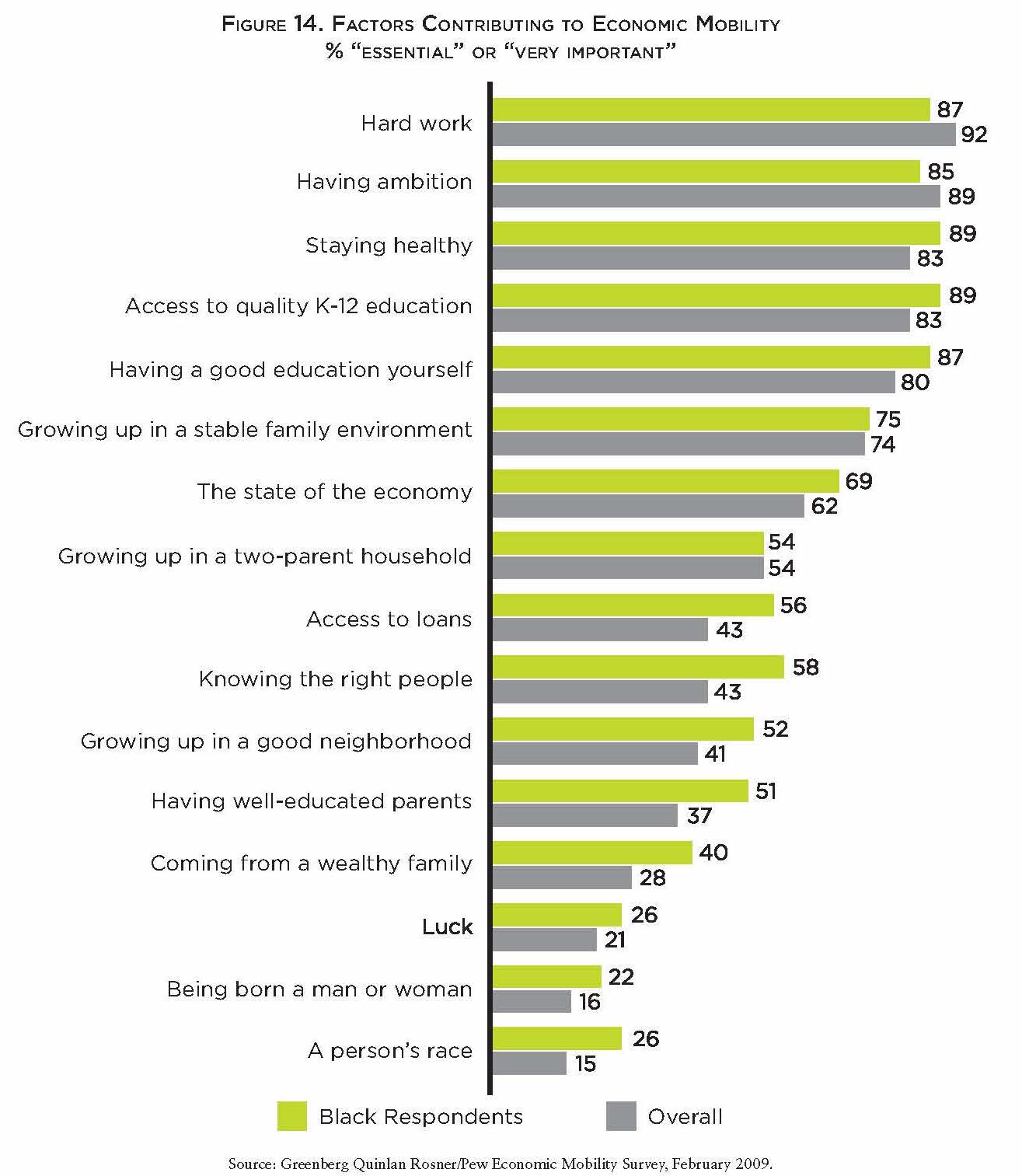
According to “A Tale of Two Fathers,” a study done by the Pew Research Center in May 2011, education is a top priority and concern for all Americans, and one area where people readily see a collective stake and a collective responsibility. Though the economy is currently the top priority, education consistently ranks near the top of American concerns. Currently, 66 percent say improving education should be a “top priority.”
Further, there is widespread agreement that education matters to economic mobility. In fact, of a list of factors contributing to economic mobility, education is the only factor that is widely viewed as a collective responsibility. All other popular contributors to economic mobility are grounded in personal responsibility and family values, such as hard work, ambition, staying healthy, a stable family, knowing the right people, a good neighborhood, luck, gender, and race (see Figure 14). Interestingly, unlike so many other attitudes in this review, black respondents’ views are largely in line with the views of the population overall. Race is one of the few exceptions, with 26 percent of black respondents saying it is an important factor contributing to economic mobility, while just 15 percent of respondents overall agree. (Greenberg Quinlan Rosner, 2009)
The role of education in creating opportunity is particularly valued in the black community. In Allstate’s 2011 Heartland Monitor poll, a majority of black respondents prioritize education as the most important factor in creating opportunity, compared with just one-third of white respondents. Additionally, of a series of problems, more black men choose “young Black men not taking their education seriously enough” over any other problem (31 percent), demonstrating the black community’s commitment to the issue. (Washington Post/Kaiser Family Foundation/Harvard University, 2006) But black youth (54 percent) are more likely than white youth (31 percent) to believe that black youth receive a poorer education on average than do white youth. (Black Youth Project, University of Chicago, 2005)
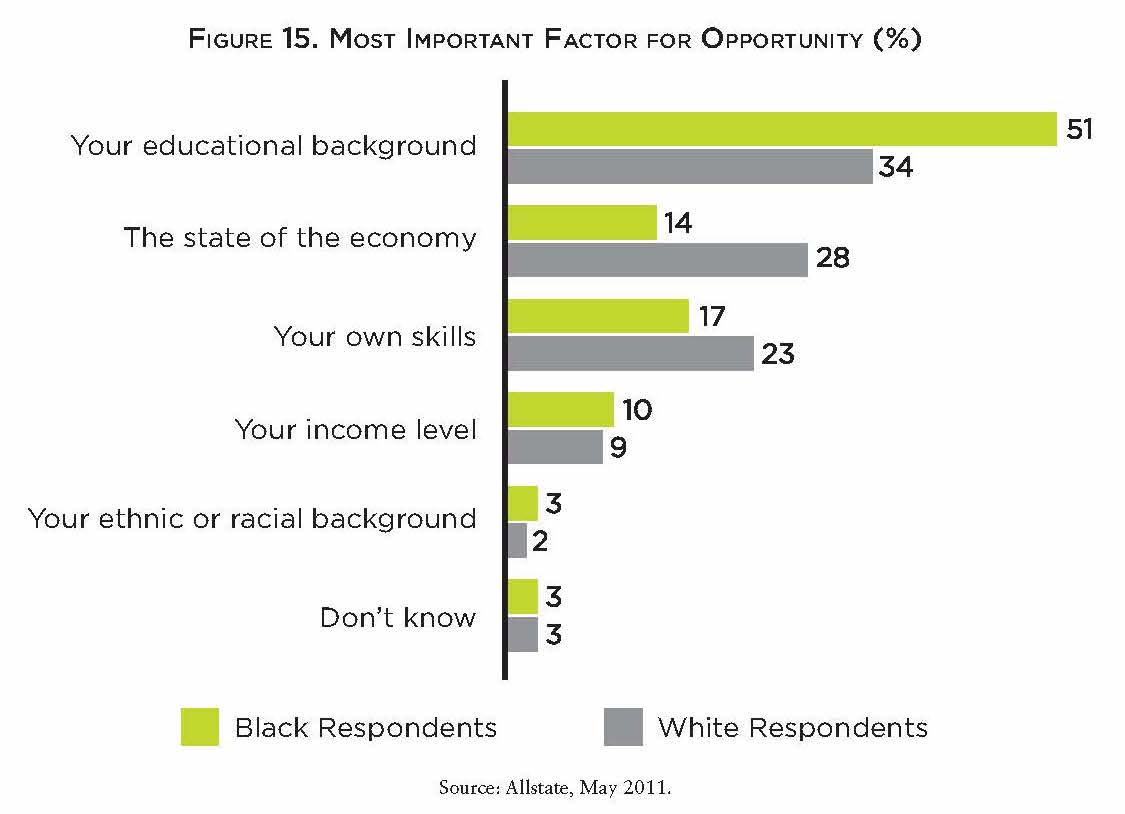
Importantly, Americans say they are willing to make low-income and minority children a priority in education efforts: 66 percent say they would be willing to pay more taxes “for funding preschool programs for children from low-income or poverty-level households,” 81 percent believe these preschool programs will help children perform better in school later, 81 percent believe it is possible to close the achievement gap, and 88 percent say closing this gap is an important goal. However, respondents also feel the achievement gap is due to factors other than the quality of education received (77 percent), and 70 percent blame societal problems for the ills facing schools. (Gallup, 2006)
Education affords the opportunity to discuss what we can do collectively to advance people’s well-being, rather than simply allowing people to blame lack of ambition and hard work. Education also allows an opening to garner support for addressing the needs of black children (and low-income children). Leading with discrimination and racial disparities may not be the strongest starting point for the conversation, however.
First, as noted above, race is the least cited factor in economic mobility, and is viewed as far less of a factor than education. Overall, 75 percent of respondents believe that black children “have as good a chance as white children in your community to get a good education.” Fully 80 percent of whites agree, while just 49 percent of blacks agree. (Gallup, July 2008)
However, according to a 2008 study done by the Opinion Research Corporation for CNN and Essence magazine, many Americans also believe that public schools are worse in neighborhoods in which a majority of residents are black (48 percent) than public schools in which the majority of residents are white, while 33 percent think they are the same, and 11 percent think they are better. People may not link this difference to “discrimination” (which, as noted earlier, causes people to think of interpersonal relationships) even though they recognize a real disparity and a real problem exists.
Jobs, income, and the economy
Jobs, income, and the economy are at the top of Americans’ agendas, and are central to efforts to address racial disparities. There are opportunities and obstacles in connecting these issues to racial disparities. On one hand, in the current economy, people are more able to see the role of systems/structures in aiding or impeding individual success (though opinion continues to emphasize individual responsibility). Logically, then, the current environment should be conducive to a conversation about policy solutions to address disparities. However, jobs and income represent areas where the role of race seems particularly divisive and where stereotypes are persistent.
Black Americans are optimistic about the future of the economy, their opportunity to get ahead, and their children’s opportunity to achieve. Overall, Americans are optimistic that the economy will improve over the next year (61 percent say it will improve, though only 9 percent say it will “significantly improve”). (Allstate, 2011) A slim majority (54 percent) of white Americans are optimistic, compared with three-quarters and higher of every other racial and ethnic group: black respondents (86 percent), Asian respondents (80 percent), and Latino respondents (74 percent). (Allstate, 2011)
Similarly, among people of color, two-thirds and higher say they have more opportunity to get ahead than their parents did: black respondents (69 percent), Asian respondents (67 percent), and Hispanic respondents (62 percent) — but just 36 percent of white respondents see increased opportunity. Looking ahead, majorities of black and Hispanic respondents believe their children will have more opportunity to get ahead (57 percent and 56 percent, respectively), while fewer Asian and white respondents agree (37 percent and 24 percent, respectively). (Allstate, 2011)
Black Americans see obstacles to employment and are more supportive than white respondents of an active role for government in the economy. There is widespread support for a number of policies that would improve economic mobility.
There is some recognition that the black community faces unequal economic obstacles. Overall, a slim majority (53 percent) feel that racial minorities have equal job opportunities as whites. Only 24 percent of black respondents think there are equal job opportunities, clearly an area of serious concern for the black community. While 60 percent of white respondents believe there are equal job opportunities, this represents a lower level of response than other questions around disparities. (Gallup, July 2008)
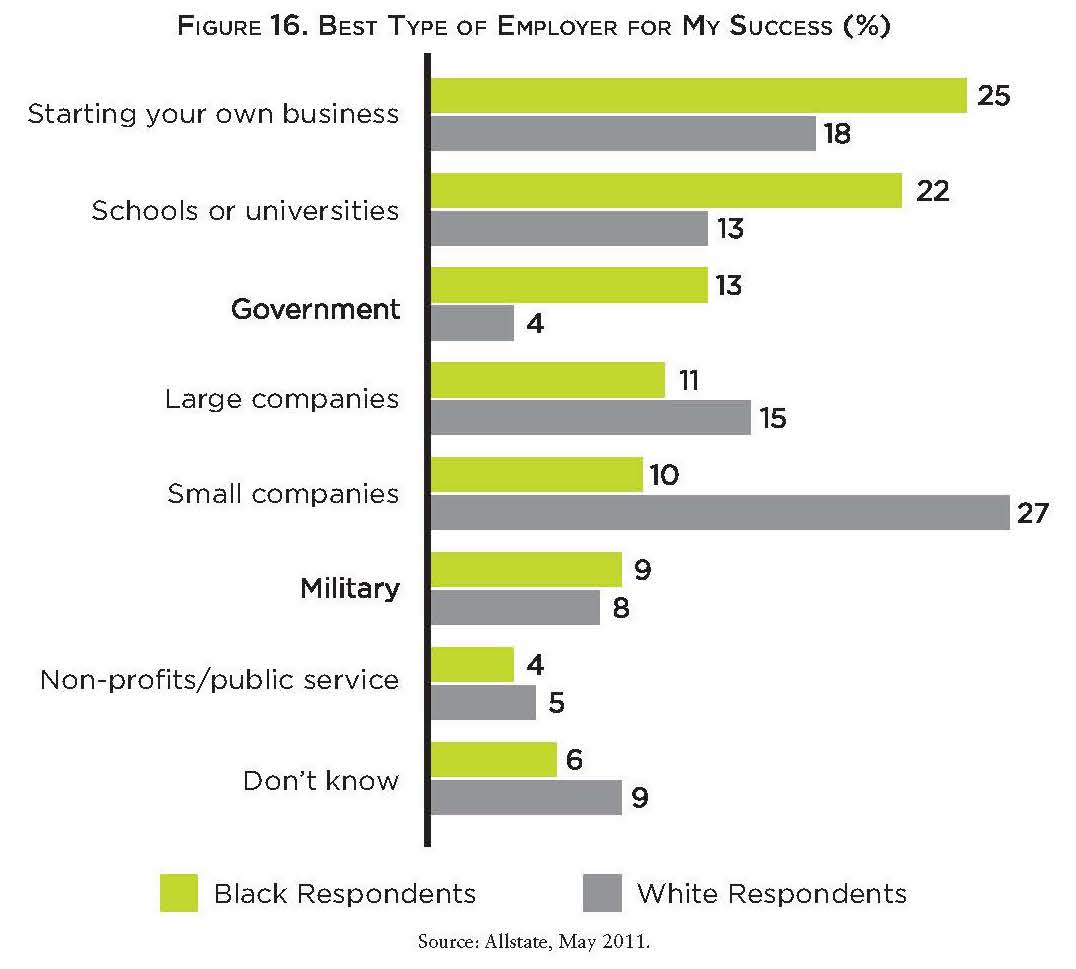
White and black respondents also disagree about the level of employment equality. Overall, 79 percent believe “that blacks have as good a chance as white people in your community to get any kind of job for which they are qualified.” Fully 82 percent of whites believe this to be true, while just 43 percent of blacks agree. (Gallup, October 2009)
Interestingly, fewer black respondents see corporate America as best for the kind of career opportunity they seek. Of a variety of choices for “Best Type of Employer,” black respondents most often select starting their own business (25 percent), followed by employment at an educational institution (22 percent) or government (13 percent). In contrast, a plurality of white respondents think small companies offer the best route (27 percent). (Allstate, 2011)
More generally, black Americans support an active, engaged government role, while white Americans are more likely to see government as a problem. A plurality of black Americans want an active role for government in ensuring that the economy works for all (42 percent), while just as many white respondents see government as the problem (42 percent). (Allstate, 2011)
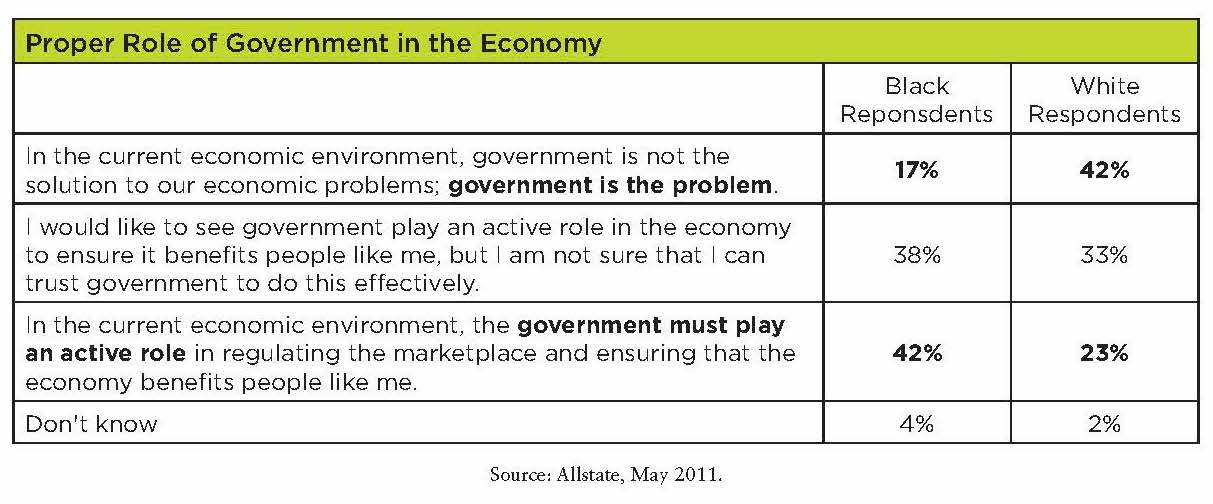
In fact, black Americans are skeptical about the consequences of the free market. Asked to choose, 49 percent of black respondents side with the view: “Left to itself the free market economy creates more opportunities than problems because it provides the most effective way to create economic growth and allow people to rise as far as their talents and hard work will take them,” while slightly fewer (43 percent) choose the alternate view: “Left to itself the free market economy creates more problems than opportunities because it creates too much inequality and leaves too many people in poverty.” This support for the free market view is the lowest of any racial group, with every other group choosing the free market by 61 percent or more. (Allstate, 2011)
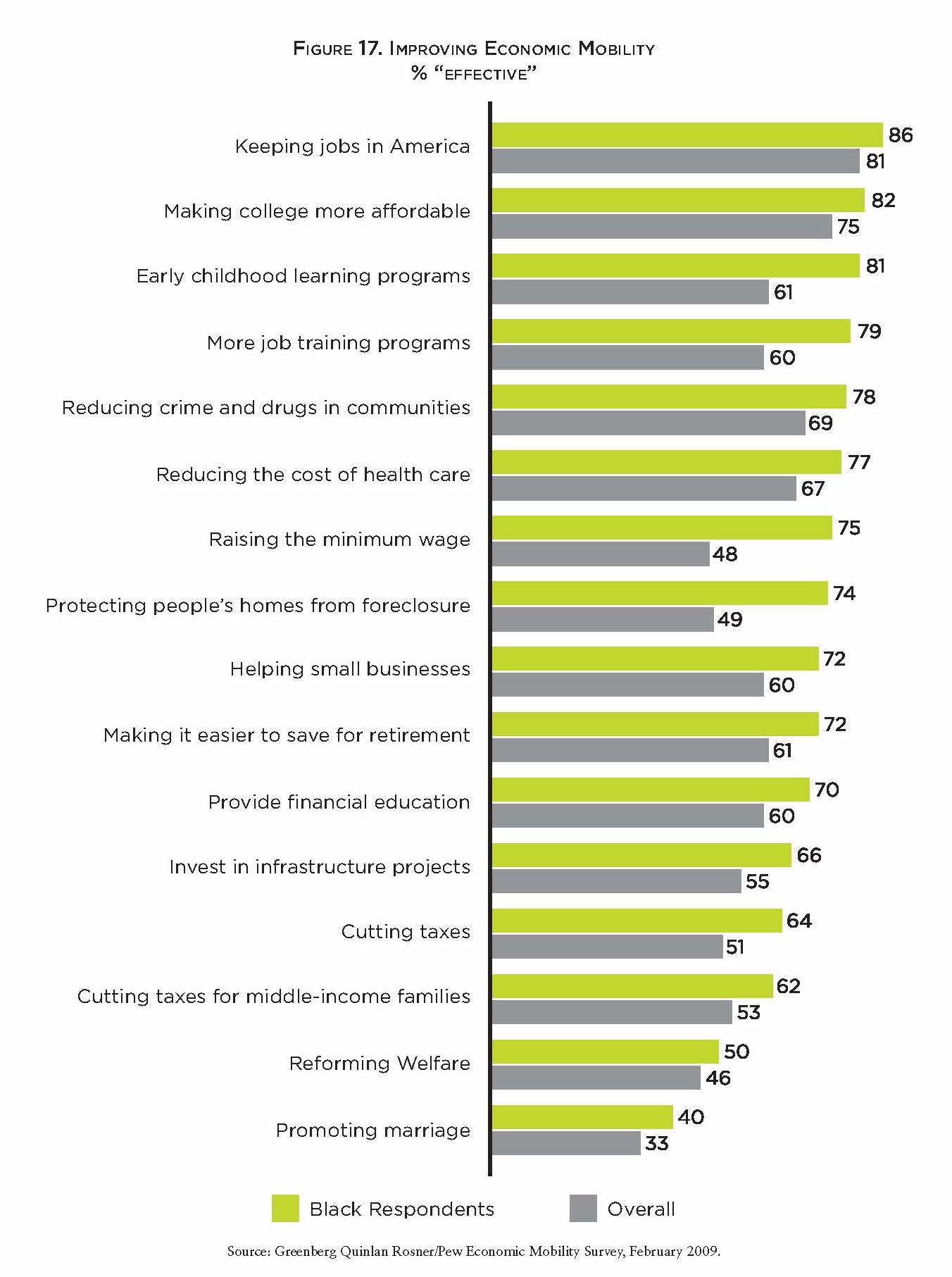
In fact, there is significant support for a range of policy priorities that would result in improved economic standing and reduced racial disparities (though none of these priorities is explicitly about race). Black respondents generally prioritize the same solutions as Americans overall, though support among black respondents for each given solution is higher than it is among the overall population. The most effective ways to improve economic mobility, according to respondents, are keeping jobs in America (86 percent of black respondents say that would be effective in improving economic mobility, and 81 percent of respondents overall say it would be effective), and making college more affordable (82 percent, 75 percent). While black respondents tend to share the same priorities as the population overall, there are a few notable exceptions where black respondents rate a solution much more highly than Americans overall: protecting homes from foreclosure (74 percent of black respondents say it would be effective in improving economic mobility, 49 percent of respondents overall say it would be effective), raising the minimum wage (75 percent, 48 percent), more job training (79 percent, 60 percent), and early childhood learning programs (81 percent, 61 percent). (Greenberg Quinlan Rosner/Pew Economic Mobility Survey, February 2009; see Figure 17)
Black Americans want federal government intervention to deal with unfair treatment of black people in their jobs. At the same time, no group, including black respondents, wants race or past racial discrimination to be a factor in developing programs to address economic inequality.
Overall, few Americans are interested in or supportive of federal government intervention in dealing with unfair treatment in employment, but a majority of black respondents support intervention. Of all Americans, 28 percent side with the view, “Some people feel that if black people are not getting fair treatment in jobs, the government in Washington ought to see to it that they do,” while 25 percent choose the alternative view, “Others feel that this is not the federal government’s business,” and 47 percent say they have no interest in this topic. A majority of black respondents (59 percent) say government should see to fair treatment, while only 22 percent of white respondents feel the same. (American National Election Studies, 2008)
Neither black respondents nor any other group necessarily want race to be a primary factor in developing economic policy solutions. For example, all races agree that “government programs to address economic inequality” should “only take into account a person’s economic situation” (87 percent overall, 90 percent among white respondents, 78 percent among black respondents), while far fewer side with the alternative that government should “give special consideration to blacks because of past racial discrimination” (9 percent overall, 7 percent among white respondents, 18 percent among black respondents). (Gallup, July 2008) Given two choices, more white respondents would emphasize ensuring that “everyone has a fair chance of improving their economic standing” (71 percent) over reducing “inequality in America” (21 percent). African American respondents respond similarly (74 percent, 20 percent). (Greenberg Quinlan Rosner/Pew Economic Mobility Survey, February 2009)
Two dynamics can undermine efforts to build broad-based support for policies to address racial disparities in jobs and income. Persistent negative stereotypes of black people have been shown to undercut support for government policies. In addition, there is a growing tendency to see individual factors, rather than the role of systems, as leading to outcomes.
Even more troubling, lack of support for welfare was driven by an image of the undeserving poor as black, lazy, and lacking in work ethics, according to Why Americans Hate Welfare by Martin Gilens (1999). The racialization of welfare is persistent. Even following significant welfare reform in the mid-1990s (which included work requirements and addressed aspects of welfare that Americans most dislike), positive public reviews of reform efforts, an improved media environment, and improved support for welfare spending, opposition to welfare continued to be conflated with stereotypes of black people’s work ethic. In 2008, Public Opinion Quarterly published Joshua Dyck and Laura Hussey’s article entitled “The End of Welfare As We Know It,” in which they wrote: “Salience, racialization, and negative tone [of public discourse surrounding welfare policy] have all decreased substantially … [but] we find that stereotypes about blacks’ work ethic continue to predict opposition to welfare spending just as strongly as they did prior to the passage of welfare reform.”
There is a growing question among the black community about black women’s role in the economics of their community. While there is not a lot of existing public opinion data in this area, some research suggests the role of personal responsibility seen in other areas related to success or failure also applies here. When asked why black women tend to be better educated and make more money than black men, white men and women point to individual factors: black women are less likely to have criminal records, and they work harder. Black men, however, are most likely to point to discrimination and are less likely to see hard work as the distinguishing factor. (Washington Post/Kaiser Family Foundation/Harvard University, 2006)
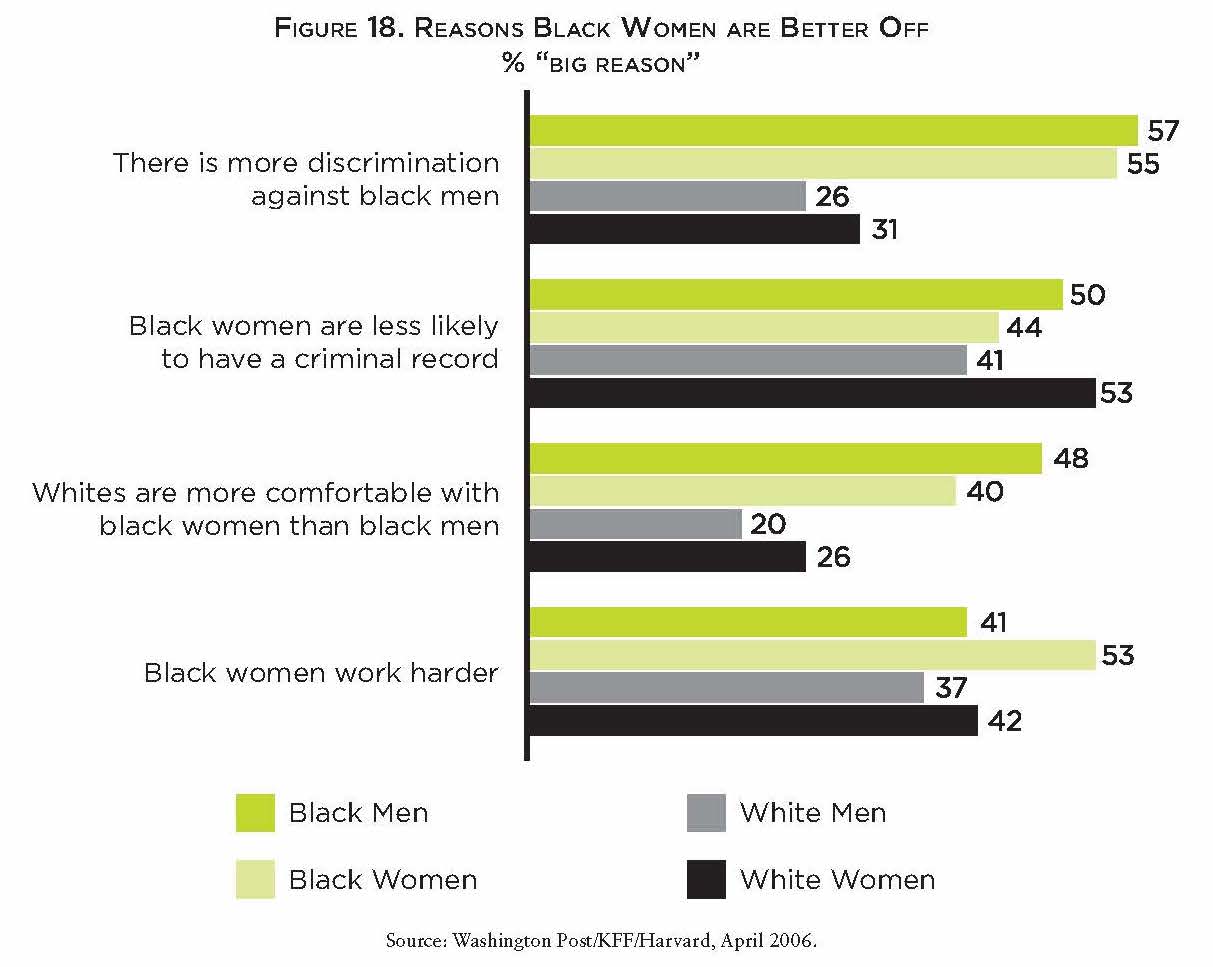
The justice system
f all the issue areas, white respondents are somewhat more likely to see discriminatory treatment against black Americans in the justice system. It may be that frequent news coverage of mistreatment, including video evidence, has influenced public opinion on this measure.
Crime has declined as a national priority. In 2001, 76 percent of Americans said that “reducing crime should be a top priority” but in a recent study that figure stands at just 44 percent. (Pew, 2011) And yet, as noted earlier in this report, crime continues to be a top concern among black respondents. (Washington Post/Kaiser Family Foundation/Harvard University, 2011)
Also, as noted earlier, when people consider the role of discrimination in leading to different kinds of disparities, white Americans are most likely to say racial discrimination is a major factor in explaining why there is a “Higher percentage of Blacks in US prisons” (44 percent) over any other reason. (Gallup, July 2008)
However, when offered other reasons for imprisonment, the role of discrimination quickly fades for white respondents, especially white men. While black respondents readily point to a range of influences accounting for racial disparities in crime, white respondents do not typically see the same influences. Black men point to a number of reasons for higher levels of imprisonment among black men. The gap between views is largest on discrimination as a factor, such as “Police are more likely to target Black men than whites” (71 percent of black men say this is a big reason black men are more likely to be imprisoned, 29 percent of white men say this is a big reason black men are more likely to be imprisoned), and “courts are more likely to convict Black men than whites” (67 percent and 21 percent, respectively). White women are more likely to recognize the role of police targeting (40 percent cite it as a “big reason”), but not court bias (28 percent). (Washington Post/Kaiser Family Foundation/Harvard University, 2006)
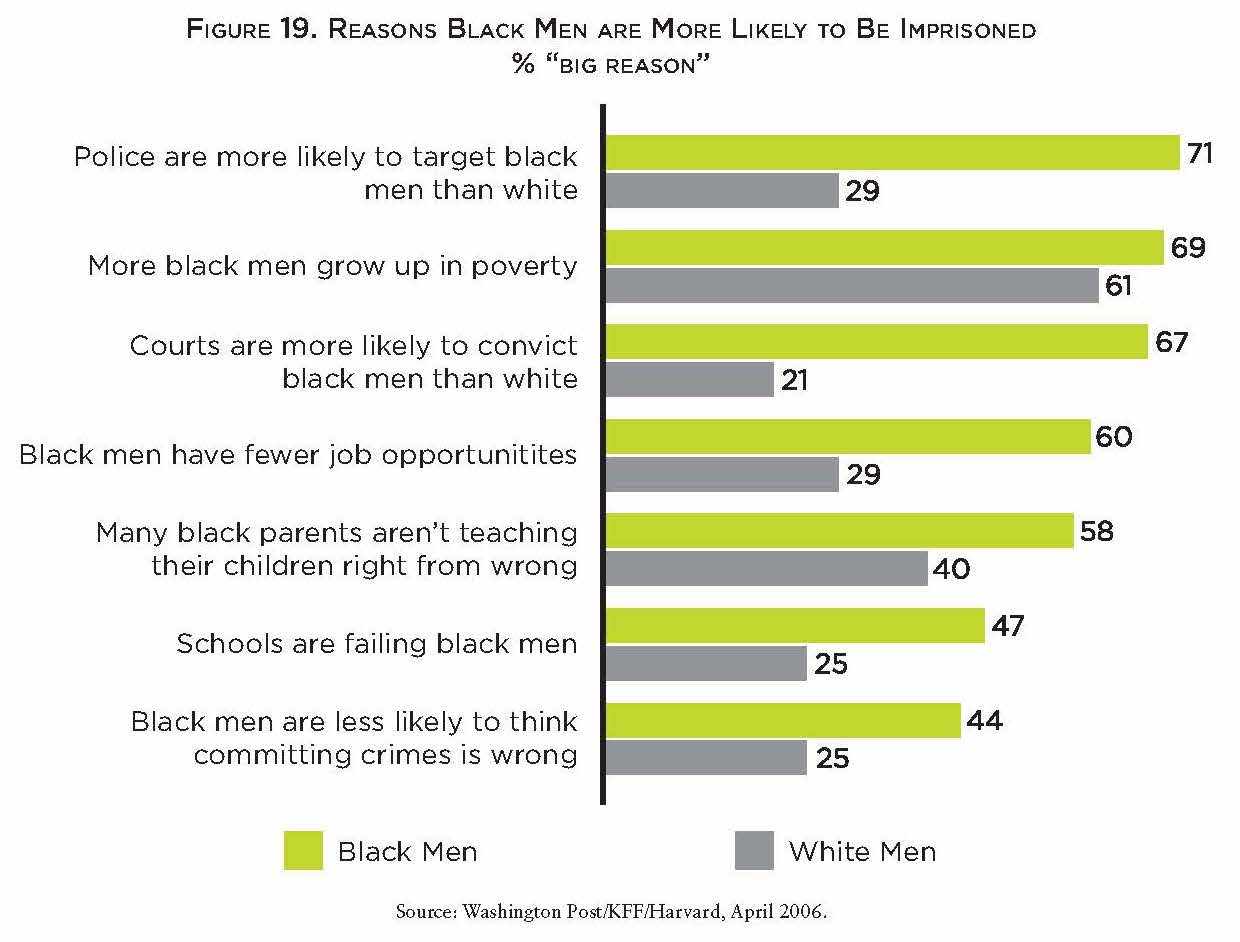
Opinion is closest on the idea that more black men grow up in poverty (69 percent of black men, and 61 percent of white men). Other systemic factors show a divergence in opinions, such as black men having fewer job opportunities (60 percent and 29 percent, respectively) and schools are failing black men (47 percent, 25 percent). (Washington Post/Kaiser Family Foundation/Harvard University, 2006)
Black men rate every reason higher than other demographic groups do, including reasons that seem to blame blacks overall and black men specifically, such as being less likely to think crime is wrong (44 percent of black men, 25 percent of white men) and black parents not teaching their children right from wrong (58 percent, 40 percent). (Washington Post/Kaiser Family Foundation/Harvard University, 2006)
Surveys consistently show that black respondents have less confidence in police and in the justice system than white respondents do. While across all respondents 73 percent have confidence (37 percent a great deal of confidence) in the local police to treat blacks and whites equally, among white respondents there is far more confidence (81 percent in total, 42 percent “a great deal” of confidence) than among black respondents (45 percent and 12 percent, respectively). (Gallup, July 2008)
Furthermore, white respondents are far less likely than black respondents to raise concerns about police bias. White respondents have confidence that police in their community will “do a good job enforcing the law” (78 percent), “not use excessive force on suspects” (71 percent), and “treat Blacks and whites equally” (69 percent). Black respondents are less sure of any measure (54 percent, 41 percent, and 38 percent, respectively). (Pew, 2009) In addition, 67 percent of black respondents believe the American justice system is biased against blacks, while just 32 percent of white respondents believe that. (Gallup, July 2008)
Interestingly, young people may be more open to this conversation. Across race, youth believe police discriminate much more against black youth than they do against white youth (79 percent of black youth, 63 percent of white youth). (Black Youth Project, University of Chicago, 2005)
Fatherhood
The public opinion research base on fatherhood initiatives is rather thin, and tends to focus narrowly on personal behaviors and involvement with children, rather than take a broader view on policy or social action.
Clearly there has been a shift in the last half century: more children live apart from their fathers, but those who live with their fathers are getting more care and attention from them.
In 2010, 27 percent of minor children lived apart from their fathers, up from 11 percent in 1960. Black fathers are twice as likely as white fathers to live apart from their children (44 percent and 21 percent, respectively). (Pew, 2011)
At the same time, fathers who live with their children are spending far more time with them than in past generations. In the mid-1960s, fathers spent an average of 2.6 hours per week caring for their children. By 2000, that number had increased to 6.5 hours per week. (Pew, 2011)
Americans value the role of fathers in raising children, and give today’s fathers mixed reviews in the job they are doing.
Americans agree that a child needs a father in the home to grow up happily (69 percent), and even higher percentages agree that a child needs a mother in the home to grow up happily (74 percent). (Pew, 2011)
Americans are mixed on whether fathers today play a greater role (46 percent) or lesser role (45 percent) in raising their children compared with 20 or 30 years ago. Survey respondents do not think fathers compare well with their own fathers — 40 percent say today’s fathers are doing about the same job as the last generation, while 34 percent say they are doing a worse job, and just 24 percent say “better job.” Fathers, however, tend to say they are doing about the same job as their fathers did (47 percent) or are doing a better job (47 percent). (Pew, 2011)
A large majority (57 percent) believe it is more difficult to be a father today than 20 or 30 years ago. (Pew, 2011)
When they consider the problems facing black families today, far fewer black respondents point to unmarried parents as a big problem, compared to other problems. As noted earlier, they are far more likely to emphasize the lack of good jobs, and the prevalence of drugs, alcohol, and crime, as shown in the table below. (Pew, 2009)
